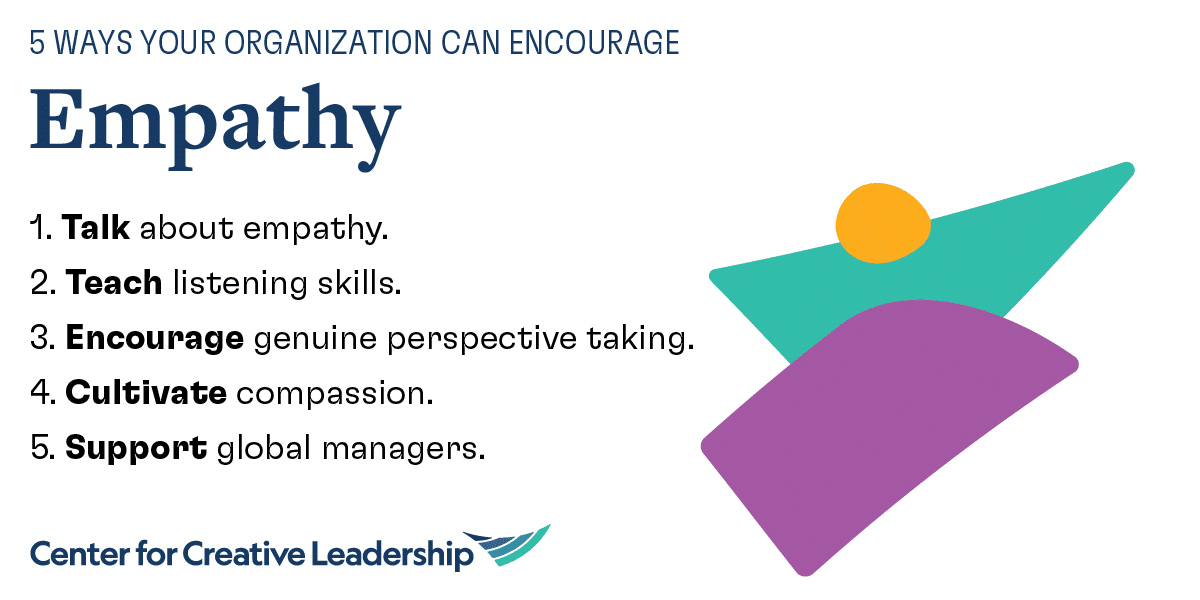Why Empathy at Work Matters & How to Encourage Empathetic Leadership
It’s critical for companies to hire and develop more effective managers and leaders capable of moving their organization forward during both good and challenging times. That requires looking beyond traditional strategies for management development and cultivating the skills most important for success.
One of those skills, perhaps unexpectedly, is empathy — a vital leadership competency.
Empathetic leadership means having the ability to understand the needs of others, and being aware of their feelings and thoughts. Unfortunately, it has long been a soft skill that’s overlooked as a performance indicator. Our research, however, has shown that today’s successful leaders must be more “person-focused” and able to work well with people from varying teams, departments, countries, cultures, and backgrounds.
To determine if empathy influences a manager’s job performance, we analyzed data from 6,731 mid- to upper-middle-level managers in 38 countries. The leaders in our study were rated on their level of empathy, as measured by our Benchmarks® 360-degree feedback assessment.
As noted in our white paper, we found that empathetic leadership is positively related to job performance, particularly among middle managers and above.
In other words, our research found that managers who practiced empathetic leadership toward direct reports were viewed as better performers by their bosses. The findings were consistent across the sample: those managers who were rated as empathetic by subordinates were also rated as high performing by their own boss.
The ability to be compassionate and connect with others is critical to our lives, both personally and professionally. Demonstrating empathy in the workplace — a key part of emotional intelligence and leadership effectiveness — also improves human interactions in general and can lead to more effective communication and positive outcomes, in both work and home settings.
Improve Empathy at Work at Your Organization
Today’s leaders need the ability to address complex challenges in new and innovative ways, while showing sincere empathy and compassion. Partner with us to craft a customized learning journey for your organization using our research-based leadership topic modules.
Available topics include Collaboration & Teamwork, Communication, Conflict Resolution, Emotional Intelligence Training for Leaders, Psychological Safety, and more.
Defining Empathy in the Workplace
Empathy is the ability to perceive and relate to the thoughts, emotions, or experiences of others. Those with high levels of empathy are skilled at understanding a situation from another person’s perspective and lead with compassion.
Empathetic leadership in the context of the workplace simply means that people leaders are able to establish true connections with one another that enhance relationships and performance.
It’s important to remember the difference between sympathy and empathy, as the 2 are often confused.
- Sympathy is typically defined by feelings of pity for another person, without really understanding what it’s like to be in their situation.
- Empathy, on the other hand, refers to the capacity or ability to imagine oneself in the situation of another, experiencing the emotions, ideas, or opinions of that person.
Empathy in the workplace and empathetic leadership is often more productive and supportive.
How to Show More Empathetic Leadership
4 Ways to Increase Your Empathy in the Workplace
Displaying empathetic leadership can take many shapes and forms. We recommend leaders take the following 4 steps to show greater empathy in the workplace and with their colleagues and direct reports.
1. Watch for signs of burnout in others.
Work burnout is a real problem today, and it comes at greater risk during times of intense stress and pressure. Many people are stressed, putting in more work hours than ever before and finding it difficult to separate work and home life.
Managers who are skilled at empathetic leadership are able to recognize signs of overwork in others before burnout becomes an issue that results in disengagement or turnover. This might mean taking a few extra minutes each week to check in with team members and gauge how they’re handling their current workload and helping them to recover from overwork.
2. Show sincere interest in the needs, hopes, and dreams of other people.
Part of leading with empathy involves working to understand the unique needs and goals of each team member and how to best match work assignments to contribute to both performance and employee satisfaction. Team members who see that their manager recognizes them in this way are more engaged and willing to go the extra mile. Showing kindness in the workplace can boost performance and culture.
3. Demonstrate a willingness to help an employee with personal problems.
Lines between work and personal life are becoming increasingly blurred. Empathetic leaders understand that their team members are dynamic individuals who are shouldering personal problems while having to maintain their professional responsibilities. They recognize that it’s part of their role to lead and support those team members when they need it most.
Keeping open lines of communication and encouraging transparency is a good way to foster psychological safety among the group and help team members feel comfortable sharing when it’s necessary.
4. Show compassion when other people disclose a personal loss.
Real connections and friendships at work matter, and empathetic leadership is a tool that managers can use to establish bonds with those they’re privileged to lead. We’ve all been through personal loss, so even if we can’t relate to the specific loss our team member experiences, we can act empathetically and let them know they’re supported. This is key for compassionate leadership.
How Organizations Can Encourage Empathetic Leadership
Some leaders naturally show more empathy at work than others and will have an advantage over their peers who have difficulty expressing empathy. Most leaders fall in the middle and are sometimes or somewhat empathetic.
Fortunately, it’s not a fixed trait. Empathetic leadership can be learned. If given enough time and support, leaders can develop and enhance their empathy skills through coaching, training, or developmental opportunities and initiatives.
Organizations and HR leaders can encourage a more empathetic workplace and help managers improve their empathy skills in a number of simple ways.
5 Ways to Encourage Empathy in the Workplace
1. Talk about empathy at work to signal its value.
Let leaders know that empathy matters. Many managers consider task-oriented skills such as monitoring and planning to be more important in controlling the performance of their team members. But research shows that understanding, caring, and developing others is just as important, if not more important, particularly in today’s workforce.
Explain that giving time and attention to others fosters empathy, which in turn enhances your performance and improves your perceived effectiveness.
2. Teach listening skills.
To understand others and sense what they’re feeling, managers must be good listeners, skilled in active listening techniques, who let others know that they’re being heard and express understanding of concerns and problems.
When a manager is a good listener, people feel respected, and critical trust on the team can grow. To show the highest levels of empathy in the workplace, managers should focus on listening to hear the meaning behind what others are saying by paying attention to not only the words being said, but also the feelings and values being shown, through nonverbal cues such as tone, pace of speech, facial expressions, and gestures.
3. Encourage genuine perspective-taking.
Managers should consistently put themselves in the other person’s place. For managers, this includes taking into account the personal lived experiences or perspectives of their employees. It also can be applied to solving problems, managing conflicts, or driving innovation. It’s very helpful to understand the role social identity plays for both yourself and others. In particular, empathy is an imperative for effective organizational diversity initiatives.
4. Cultivate compassion.
Support managers who care about how others feel, and consider the effects that business decisions have on employees, customers, and communities. Go beyond the standard-issue values statement and allow time for compassionate reflection and response. Remember, your employees care about social responsibility; your organization should too.
5. Support global managers.
The ability of your middle managers to be empathetic leaders who can collaborate across boundaries is especially important for those working in global or cross-cultural organizations. Leading a multicultural team requires cultural intelligence and the ability to understand people who have very different perspectives and experiences.
A Closing Thought on Empathy in the Workplace
And as the data we shared above shows, when managers hone their empathetic leadership skills, they improve their effectiveness and increase their chances of success in the job. Empathetic leaders are assets to organizations, in part because they are able to effectively build and maintain relationships and retain talent — a critical part of leading organizations anywhere in the world.
Ready to Take the Next Step?
Model empathetic leadership and help your people develop greater empathy in the workplace with a customized learning journey for your leaders using our research-backed modules. Available leadership topics include Boundary Spanning Leadership, Communication, Emotional Intelligence Training for Leaders, Listening to Understand, Psychological Safety & Trust, and more.










